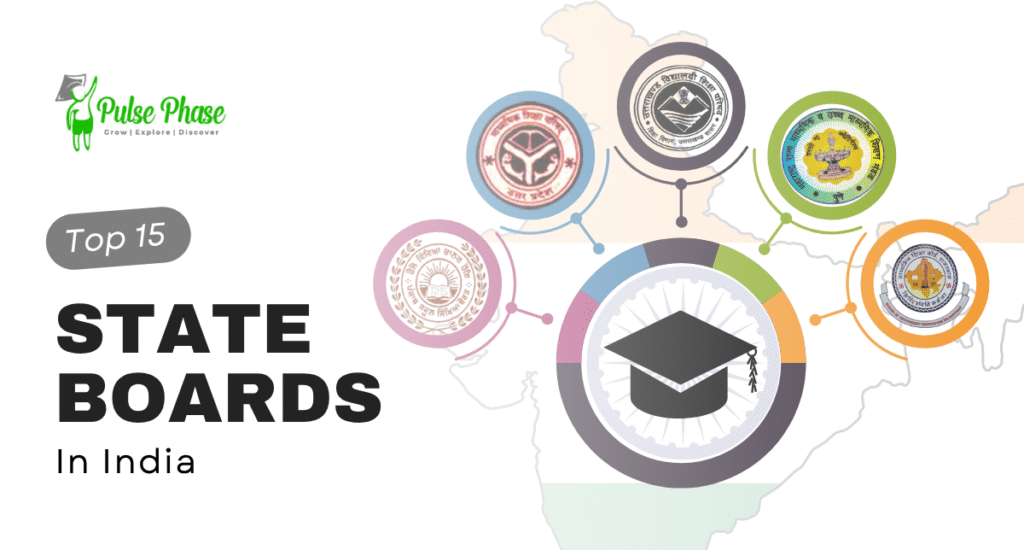The education system of schools in India is divided across national boards and local boards for each state. With national boards like CBSE and ICSE being most famous, state education boards represent a greater fraction of students from both rural and urban areas. Each state board is responsible for the curriculum it has created, conducting the board exams taken by 10th-grade (SSLC in some Southern states) and 12th-grade (HSC in a few) students, and providing the criteria for schools affiliated with it.
For this guide, we have taken the time to craft the list of the top 15 best education state boards in India providing some of the requirements for the NC Exams, their traits, benefits, and limitations, emphasizing their significance, and including some definitions that one would want to ask, such as which school would be best suited for the exams.
List of Top 15 State Boards in India
Here is a state-wise list of prominent education boards across the country:
Maharashtra State Board of Secondary and Higher Secondary Education (MSBSHSE)
Conducts SSC (10th) and HSC (12th) exams. Known for a balanced syllabus and consistent academic structure.
Website: www.mahahsscboard.in
Tamil Nadu State Board of School Examinations
Conducts SSLC (10th) and HSC (12th) board exams. The board has a structured syllabus and state-centric content.
Website: www.dge.tn.gov.in
Karnataka Secondary Education Examination Board (KSEEB)
Responsible for SSLC and PUC (Pre-University) exams. Offers Kannada and English medium education.
Website: www.kseeb.karnataka.gov.in
Andhra Pradesh Board of Secondary Education (BSEAP)
Conducts SSC and Intermediate exams. Known for simple and student-friendly textbooks.
Website: www.bse.ap.gov.in
Telangana State Board of Secondary Education (BSE Telangana)
Manages SSC and intermediate education. Focuses on foundational learning and regional knowledge.
Website: www.bse.telangana.gov.in
Uttar Pradesh Madhyamik Shiksha Parishad (UPMSP)
One of the largest boards in the country, handling 10th and 12th class examinations.
Website: www.upmsp.edu.in
Board of Secondary Education, Rajasthan (BSER)
Conducts Secondary and Senior Secondary exams. Offers subjects in Hindi and English mediums.
Website: www.rajeduboard.rajasthan.gov.in
West Bengal Board of Secondary Education (WBBSE) & WBCHSE
Handles Madhyamik (10th) and Uchha Madhyamik (12th) education. Known for its focus on arts and languages.
Website: www.wbbse.org
Gujarat Secondary and Higher Secondary Education Board (GSEB)
Conducts SSC and HSC exams in Gujarati and English mediums.
Website: www.gseb.org
Punjab School Education Board (PSEB)
Offers quality education in Punjabi and English with a focus on moral values.
Website: www.pseb.ac.in
Bihar School Examination Board (BSEB)
Conducts Matric and Intermediate board exams annually and supplementary exams.
Website: www.biharboardonline.bihar.gov.in
Madhya Pradesh Board of Secondary Education (MPBSE)
The syllabus aligns partially with the NCERT for higher secondary subjects.
Website: www.mpbse.nic.in
Kerala Board of Public Examinations (KBPE)
Has a strong focus on literacy, holistic learning, and academic performance.
Website: www.keralapareekshabhavan.in
Odisha Board of Secondary Education (BSE Odisha)
Offers multilingual education and accessible exams for tribal and rural students.
Website: www.bseodisha.ac.in
Jharkhand Academic Council (JAC)
Manages Matric and Intermediate level exams with a focus on both local and national-level curriculum.
Website: www.jac.jharkhand.gov.in
Also Read About: CBSE Schools in India
Top Features of State Boards
- Local Language Support: Most boards offer instruction in both regional languages and English.
- SSC, SSLC & HSC Exams: Clear bifurcation between 10th class (secondary) and 12th class (higher secondary) levels.
- Custom Syllabus: Boards design their syllabus and textbooks tailored to regional needs.
- Annual Exams & Supplementary Exams: Each board conducts main board exams followed by supplementary exams for students who need a second chance.
- Textbook Publication: Most states have their own textbook corporations that supply books to government and private schools.
Benefits of State Boards
- Regional Relevance: Courses reflect local culture, history, and environment.
- Affordability: State board-affiliated schools often charge lower fees than CBSE/ICSE institutions.
- Rural Outreach: Wide accessibility across remote and rural regions.
- Flexible Learning: Some boards allow open schooling and private candidates.
- Board Preparation Resources: Most state boards provide model papers, blueprints, and sample questions for board exam preparation.
Also Read About: NIOS Schools in India
Drawbacks of State Boards
- Inconsistency Across States: Syllabi and standards vary widely.
- Limited Focus on Critical Thinking: Emphasis on rote learning over conceptual clarity.
- English Proficiency Issues: Many students face challenges in national-level exams due to weaker English language exposure.
- Quality of Textbooks: In some states, outdated or low-quality textbooks affect learning outcomes.
- Less Alignment with National Exams: Boards that don’t use NCERT books can put students at a disadvantage in entrance exams.
Also Read About: IB Schools in India
State Board & Competitive Exam Preparation
Most competitive exams like NEET, JEE, CLAT, and CUET follow the NCERT syllabus. Here’s how students from state education boards can bridge the gap:
- Adopt NCERT books, especially for science, mathematics, and social science, from classes 9 to 12.
- Use Online Resources: Platforms like NTA, Khan Academy, and YouTube channels provide free study material.
- Practice with Mock Tests: Helps understand time management and exam patterns.
- Attend Coaching Classes: Either online or offline for guided preparation.
- Focus on English Language Skills: Essential for entrance exams with comprehension or grammar sections.
ALSO READ ABOUT: Top Schools in India
Conclusion
The best state education boards in India are those that balance regional relevance with national competitiveness. While each board has its strengths and limitations, students can succeed with the right strategy, extra preparation, and resources. With increased focus on curriculum updates, digital resources, and exam reforms, state boards are evolving to meet the demands of modern education.
Ultimately, a student’s success depends not just on the board but on their efforts, learning environment, and access to quality educational support.
FAQs
Q1. Which state board is best for the 12th class science stream?
Boards like Maharashtra, Tamil Nadu, and Kerala offer structured and detailed science streams suitable for engineering and medical entrance exam preparation.
Q2. What is the difference between SSC, SSLC, and HSC?
- SSC/SSLC: Refers to the 10th class board exams.
- HSC: Refers to the 12th class board exams.
Q3. Are state boards recognized for college admissions?
Yes, every state-wise school board is recognized by the respective government and eligible for college admission across India.
Q4. What are supplementary exams?
These are re-exams conducted for students who did not pass in one or more subjects in the annual board exams.
Q5. How can state board students prepare for JEE or NEET?
By supplementing their state board syllabus with NCERT books, mock tests, and coaching support, students can compete effectively.
Q6. Is the Tamil Nadu State Board difficult?
It is known for a well-structured curriculum, though it is considered relatively easier than boards like CBSE or ICSE in some subjects.
Q7. Does the UP Board follow the NCERT syllabus?
Yes, the Uttar Pradesh Madhyamik Shiksha Parishad has gradually adopted NCERT content, especially for classes 9 to 12.
Q8. Which board is better for the arts and humanities?
The West Bengal, Punjab, and Rajasthan State Boards in India are appreciated for their focus on regional literature, history, and humanities.
Q9. Can a student switch from the state board to CBSE in higher classes?
Yes, though it might involve syllabus gaps and subject mapping, it is generally allowed with school approval.
Q10. Do state boards regularly update their syllabi?
Some Top State Boards in India update their syllabus every few years, while others integrate national content (like NCERT) to keep up with standards.

